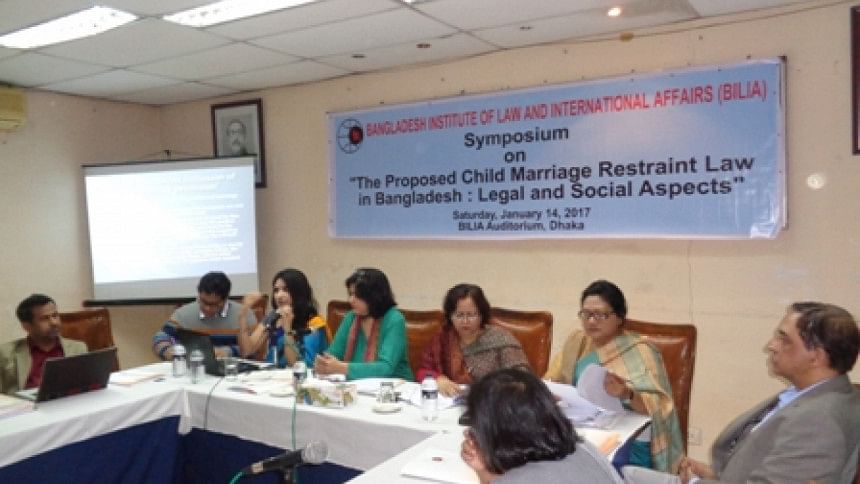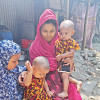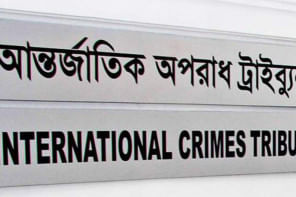Symposium on “The Proposed Child Marriage Restraint Law in Bangladesh: Legal and social aspects”

In Bangladesh child marriages is one of the most common phenomenon and the existing law in the country has failed to eliminate child marriage. Recognising the international obligations of Bangladesh, the Prime Minister pledged at the 2014 Girls Summit to actively reduce and eventually end child marriages in Bangladesh. With that end a new stricter law on restricting child marriage has been drafted which is awaiting final legislative approval. The Cabinet of the Government of Bangladesh has approved the Child Marriage Restraint Act 2016 on 24 November 2016 and placed the bill to the Parliament for passing. However, the proposed Child Marriage Restraint Act has been facing severe criticisms both from local rights groups and civil society members and from international rights organisations.
Considering the implication of this proposed law in our country and to give appropriate insight to this matter, two papers have been presented in a symposium titled as “The Proposed Child Marriage Restraint Law in Bangladesh : Legal and Social Aspects”, organised by Bangladesh Institute of Law and International Affairs (BILIA) on Saturday, January 14th. The speakers were Ms. Taslima Yasmin, Assistant Professor, Department of Law, University of Dhaka and Mr. Mohammad Bellal Hossain, Associate Professor, Department of Population Science, University of Dhaka. The event was hosted by Dr. Shahdeen Malik, Honorary Director of BILIA and chaired by Barrister Sara Hossain, Honorary Executive Director of Bangladesh Legal Aid and Services Trust.
Ms. Taslima Yasmin presented her paper on ‘The Proposed Child Marriage Restraint Law: A Step Backwards?’. Her paper endeavored to analyze the new draft law in comparison with the existing law, in order to assess how far the new provisions would prove to be more effective in addressing the overall child marriage phenomenon in Bangladesh. She highlighted the principal focus of the critics, which is inclusion of a special provision in the draft law whereby a child marriage within the definition of the law will not be considered an offence if the marriage takes place in special circumstances with the permission of the court and consent of parents and in the best interest of the ‘underage woman’ in question. She mentioned that inclusion of this special provision has been viewed by many as impliedly encouraging child marriages and has been feared to have a severe negative impact on the age long efforts of the rights advocates in creating social awareness against marriage of a girl child below 18 years.
Mr. Mohammad Bellal Hossain presented his paper on ‘Potential Implications of Proposed Child Marriage Restraint Act-2016 on the Social Context of Child Marriage in Bangladesh’. He stressed on Bangladesh’s progress toward Prime Minister' Sheikh Hasina’s commitment regarding the reduction of child marriage and how the proposed law might influence the social context within which the child marriage is taking place in the country, which will ultimately slower the progress of achieving Prime Minister’s commitment.
Following the presentations, the chair, discussants, host, officers of the Ministries, academicians, researchers & legal practitioners and activists expressed their views in an open discussion.
Advocate Fawzia Karim Firoze, President, Bangladesh National Women Lawyers' Association articulated that we do not need stricter laws in these kind of matters rather we should focus on drafting laws in a manner which is friendly to meet up our social needs and practically enforceable. Advocate Salma Ali, Executive Director, Bangladesh National Women Lawyers' Association mentioned that we must uphold our international commitments and the same should be reflected both in law and its enforcement. Barrister Tapas Kanti Baul, Prosecutor, The International Crimes Tribunal, Bangladesh stated that the proposed child marriage law is mirroring our existing patriarchal society and hence should be reconsidered by the law makers before passing the bill.
Dr. Shahdeen Malik added that we must focus on the benefit of the society while drafting any law and should not be stuck in personal laws only if they are proved to be harmful for the people as the law should not facilitate anything that is damaging for society.
Barrister Sara Hossain turned the spotlight on analyzing the constitutional provisions and international laws while finalizing the proposed law on child marriage. She mentioned that while drafting these laws, universal human rights should not be ignored as laws that involve human rights issues should not be differently implemented in developed and developing countries.
In the end, it was unanimously agreed that reconsideration is required before passing this child marriage restraint law and the issues raised in this symposium must not be ignored.
The event was covered by Tasmiah Nuhiya Ahmed, Research Assistant (Law) at Bangladesh Institute of Law and International Affairs (BILIA).

 For all latest news, follow The Daily Star's Google News channel.
For all latest news, follow The Daily Star's Google News channel. 






Comments